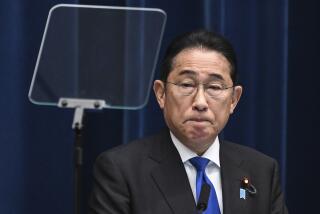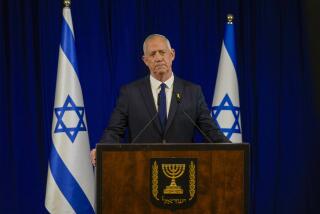Foreign Minister Quits in Japan, Cites Ill Health
- Share via
TOKYO — Japanese Foreign Minister Michio Watanabe resigned today after months of struggling with poor health, a move expected to reshape the ruling party’s political landscape but reinvigorate the nation’s diplomacy.
Prime Minister Kiichi Miyazawa appointed his top aide, Yohei Kono, to serve as acting foreign minister. But he began meeting today with potential successors to the post, including Tsutomu Hata, a Liberal Democratic Party leader and avid proponent of political reform.
Watanabe, 69, an earthy politician known for his candor and wit, also resigned from his post as vice prime minister.
His resignation is likely to have its most significant impact on the prime minister’s election in the fall. As the Cabinet’s No. 2 man, Watanabe had been considered a leading contender to replace Miyazawa when his two-year term expires in September. But Watanabe’s decision to step down has all but dashed that possibility and set off a new round of political horse racing.
Political analysts also said that Japan’s diplomacy, which had been slowed by Watanabe’s ailing health, would receive a boost. Watanabe had been forced to cancel numerous meetings with foreign dignitaries, including today’s meeting with British Foreign Minister Douglas Hurd and Monday’s imperial dinner for the Malaysian king and queen, Sultan Azlan Shah and Tuanku Bainun.
He also had missed several key budget committee meetings, hampering debate on key questions of foreign policy ranging from Japan’s aid to developing countries to its role in international peacekeeping operations.
At a time Japan is trying to expand its political influence abroad, many analysts here were privately chagrined that their No. 1 diplomat was hobbled by ill health.
“Japan’s foreign minister is important not only to Japan but to the rest of the world,” one analyst said. “But (Watanabe) did not have the power or energy to serve.”
Watanabe was first admitted to the hospital in May, 1992, for what doctors said were gallstones and an infected bile duct. He was rehospitalized Feb. 15 after returning from the United States for talks with Clinton Administration officials. He resumed his official duties March 6 but continued to commute from the hospital.
At the time, Foreign Ministry officials said Watanabe was suffering from a “cold and fatigue.” It is widely rumored that he is afflicted with a more serious condition, but it is common practice in Japanese political circles not to reveal an official’s actual disease.
More to Read
Sign up for Essential California
The most important California stories and recommendations in your inbox every morning.
You may occasionally receive promotional content from the Los Angeles Times.














